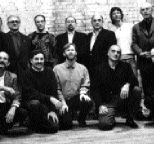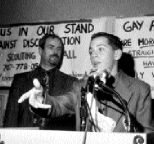No Stinkin’ Badges
The 2001 POV Season
Scout’s Honor
The Sweetest Sound
Of Civil Rights and Wrongs:The Fred Korematsu Story
According to the oath he is required to recite, a Boy Scout pledges “to keep myself physically strong, mentally awake, and morally straight.” Yet there is something crooked about the way that the Boy Scouts of America, which makes its national headquarters in Irving, Texas, has been defining “straight”–not merely as virtuous but also as heterosexual. More than 100 million Americans have been Scouts since the movement was incorporated in the United States in 1910. At present, more than three million boys are Scouts, and more than one million adults serve as Scout leaders. Like the military services that it in many ways emulates, the BSA is purging gays from its crowded ranks. Some in the Scouting movement who merely voice support for gay rights are being told to take a hike.
Scout’s Honor is the debut offering of this year’s P.O.V., PBS’s annual summer series of nonfiction films whose 14th season airs on Tuesday evenings through the end of August. In his study of the Scouts’ dishonor, director Tom Shepard documents the dubious choices made by an organization whose avowed mission is “to prepare young people to make ethical choices over their lifetimes.” He follows the cases of a few Scouts and Scoutmasters who were expelled because of their sexual orientation or their orientation toward sexual orientation. But, more than anything else, Scout’s Honor celebrates the courage and compassion of one Boy Scout, Steven Cozza, who, beginning at the age of 12, made the ethical choice to oppose the BSA’s policy against gays. An exemplary member of Troop 74 in Petaluma, California, Cozza, who is not himself gay, founded Scouting for All, an advocacy group designed to pressure the BSA into abandoning its homophobia. Though Cozza has managed to earn Eagle status, he has been harassed, ostracized, and threatened, and his father was forced out of his position as an assistant Scoutmaster. The Irving office proclaims the importance of building “character” in its young charges, and the organization ought to take pride in this particular young idealist whose dedication to Scouting’s own principles of equal opportunity compels him to speak out against the B.S. of BSA hypocrisy. To the argument that homosexual Scouts or Scoutmasters might convert others to their amorous ways, Cozza replies: “My dad went to Catholic school and was taught by nuns. And he didn’t become a nun.”
Though the BSA refused to speak to Shepard, his camera does capture some of the hostility to gays in Scouting. On talk shows, specious claims about giving license to pederasts are made, when in fact sexual orientation has as much to do with the likelihood of being a molester as it does with a boy’s ability to earn a merit badge. Tim Curran earned many badges, but, although “Be Prepared” is the Boy Scout slogan, the 19-year-old Eagle Scout was not prepared for what happened in 1981, when he was expelled from the movement in California merely for being gay. His appeals were unsuccessful, but the more recent case of James Dale seemed more promising. Another good Boy Scout who is convinced that justice will prevail, Dale in 1999 won a unanimous decision from the New Jersey Supreme Court that his ousting from Scouting violates New Jersey law. In 2000, the United States Supreme Court, on a 5-4 vote, ruled against Dale, concluding that the BSA has the Constitutional right to discriminate against gays.
Like other verdicts from the Rehnquist court, this was a hard decision for civil libertarians to swallow. If Boy Scouts sold cookies, fair-minded people could refuse to buy them. But they do solicit funds from the United Way and meet in schools, churches, and civic centers that have been more hospitable to the BSA than it is to gays. Until they honor the principles of fair play on which they were founded, a boycott of the Boy Scouts might be proper. Demonstrating that there can still be honor among ephebes, Cozza continues to speak out. So, too, does Dave Rice, a septuagenarian straight arrow and sexual straight who was dismissed as a Scoutmaster when he decided to join Scouting for All. Both starry-eyed and teary-eyed after more than half a century of hiking and camping, Rice still believes in the value of Scouting. Shepard’s disturbing film challenges the values of the Boy Scouts of America.
PBS has scheduled Scout’s Honor to feed to its affiliates on June 19. Subsequent Tuesday evenings will bring a variety of other nourishing works that demonstrate the artistry and urgency of nonfiction film. They are refreshing alternatives not only to the banal dramas and giddy sitcoms that fill so much of commercial broadcast time, but also to the exhibitionism that now passes for “reality TV.” The series’ second offering, scheduled for June 26, tells a different kind of truth. If most films replicate the texture of a novel, The Sweetest Sound is an essay, a whimsical meditation on names and identity.
The average daily edition of the New York Times contains 2300 names, notes director Alan Berliner, who, admitting that he actually counted, confesses his obsession with onomastics. Berliner interrogates strangers and acquaintances about their reactions to his name, and he indulges in ego-surfing–compulsive exploration of the Internet for versions of his name. Like most of the rest of us, even–or especially–if named Chang, the most common moniker on the planet, Berliner cherishes a sense of his own uniqueness, and he cannot abide the possibility that others might share his particular name. He discovers at least 12 other Alans, including another director and another photographer, who could, like our director and John F. Kennedy, proclaim: “Ich bin ein Berliner.”
He flies a dozen other Alan Berliners, all white middle-class, middle-aged men, in to his apartment in New York for a comic confrontation over the ways in which names shape personal identity.
“Does my name make me who I am, or do I determine the meaning of my name?” asks the Alan Berliner who directed The Sweetest Sound, as well as an earlier P.O.V. offering named Nobody’s Business. “Would life have been different with another name?” The Sweetest Sound probably would not have been the same if its creator had been called Orson Welles, Akira Kurosawa, or Mud. More than 90 percent of all human beings have died without leaving a name behind, notes Berliner, an exceptional member of the species determined through this film to make a name for himself.
With Of Civil Wrongs and Rights, director Eric Paul Fournier is eager to celebrate the name of Fred Korematsu, an insufficiently sung hero of American civil rights. In 1942, Korematsu, a 23-year-old Nisei welder living in his native California, refused to obey Executive Order 9066, by which 120,000 Americans of Japanese ancestry were rounded up and interned in desert camps. He faced hostility not only from non-Japanese but also from the Japanese-American Citizens League, which counseled full compliance with the wartime policies of the United States. Even the American Civil Liberties Union refused to defend Korematsu, and when one of its lawyers, Ernest Besig, defied its national board to take on the case, the only one to test the constitutionality of the Japanese internments, they lost. In 1944, a six-member majority of the United States Supreme Court, including such usual champions of the Bill of Rights as Hugo Black, William O. Douglas, and Harlan Stone, voted to uphold Korematsu’s felony conviction.
Korematsu never conceded guilt over trying to exercise the rights enjoyed by other American citizens. And 39 years later, refusing to accept a pardon for actions he did not consider criminal, he fought to clear his name. In 1983, a team of largely young Japanese-American lawyers, activists who rejected the acquiescence of their parents and grandparents, won a verdict from a federal judge that the wartime policies of the United States were infected by racism. Vindicated, Korematsu, in his eighties, today continues to align himself with progressive causes.
Like Herman Melville’s Bartleby the Scrivener, Fred Korematsu is a figure of quiet defiance; “I prefer not to” was his response to an unjust order to evacuate his home. Fournier likens him explicitly to Rosa Parks, an “ordinary” person who entered history for summoning the courage to refuse to move. His film is a work of hagiographic reclamation, a project that does not attempt to detail the indignities and afflictions of the relocations but rather focuses on the deeds of a single stubborn man. No instance of wartime treachery by Japanese-Americans–the ostensible cause for Executive Order 9066–was ever uncovered, and The Fred Korematsu Story that Fournier tells is both appalling and inspiring. But the man’s heroism might have been enhanced if the film had made more of an effort to understand the opposition, why it was so widely assumed for so long that internment camps were a necessity for civil defense. No one appears on camera to support the relocations. By clarifying exactly what went wrong with American democracy, Fournier might have paid even greater tribute to a good Boy Scout. n
Steven G. Kellman is professor of comparative literature at UT-San Antonio and the author of The Translingual Imagination.





